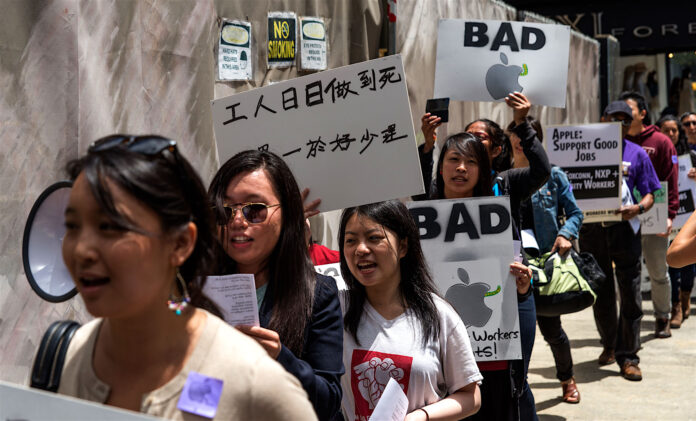What was hidden inside an enormous human factory that generates such great business success — and so much unhappiness?
I visited Foxconn, the Taiwanese contract manufacturer for Apple, on a whim. I’d been writing a research paper, and watching documentaries about, the tension between China’s rural and urban regions. A friend’s father was a manager at the factory, and friends in Hong Kong had been urging me to visit.
I mainly wanted to hear some interesting stories from people around my age, who had taken a different path in life.
Ambition and Pain
When you pick up your newest iPhone, you probably understand how Apple’s triumph rests upon its gigantic scale of supply-chain production, mostly based in Asia. As a principal manufacturer of Apple products, Foxconn employs more than 1.4 million workers in China alone. Its three campuses around Shenzhen, a one-time fishing village opposite Hong Kong, are nearly all city-sized.
Thanks to global trade, Foxconn found the last and yet the most important missing piece to complete the loop of Apple and Nintendo’s magical assembly lines—a cheap labor force. The model: designed in California, assembled in China.
I wondered: what was hidden inside an enormous human factory that generates the biggest business success, and economic miracle?
Pain was definitely part of the equation. In a 2010 incident that became internationally infamous, 18 Foxconn workers decided to end their lives, by jumping from the top of their dormitory buildings. Nor was that the last of it: in 2012, another 150 workers threatened to commit suicide, in protest against their working conditions. The operation’s high-pressure, low-treatment working environment has been gradually exposed by both Chinese and Western media. I wanted to hear the workers’ take.
A Worker’s Story
When I stepped on to the bus to Foxconn in Hong Kong, a new world seemed to open. The passengers were looking down at their cell phones; even the driver was answering phone calls nonstop.
Sue was already waiting for me at the factory. She would be my guide for the week. An amicable young teacher in the Longhua area, she told me there are only three kinds of people living in Longhua: the natives, the foreigners, and the Foxconn employees.
That was my first lesson at Foxconn.
Longhua is the biggest of Shenzhen’s three Foxconn factories. With a workforce of more than 270,000—roughly the size of Newark, N.J.—it has been breaking records as China’s largest exporter for seven years. This once-small town saw a massive influx of migration, as prospective workers arrived seeking job opportunities. Just as during the Gold Rush, the town bustled with opportunists. Soon a whole urban ecosystem revolving around them sprouted. There were new grocery stores, salons, laundromats, bars—anything with a chance to be profitable, as long as it had something to do with Foxconn.
Sue’s mom recalls the old, pre-Foxconn times, when ownership of a lottery betting parlor could support a family.
“They never missed a single possibility to change their life,” she reminisced, of residents’ approach to life in those days.
Sue’s family still owns a little convenience store in town. The apartment where she lives with her parents and her younger brother, whom I’ll call Dave, is right behind it.
Dave’s hair was long enough to cover his pale face. About three years younger than me, he started working at Foxconn after dropping out of high school. His parents had expected him to stay in school, but Dave had a different idea: He wanted to know how work felt.
“Turns out, it’s not that exciting,” he reported. The 8 p.m. to 2 a.m. night shift is certainly boring for this 18-year-old. When he is not working, playing video games occupies an essential part of his day. He also mentioned going to the beach occasionally. But apparently video games are his priority.
Dave loves excitement. He likes Hollywood movies, even though “sometimes it’s too complicated to understand, with a bunch of names and plots.” He likes to listen to “sad songs,” as long as they are not “too sad.” He does not watch much news, though, because “the government is not trustworthy.”
Dave’s assessment of the Foxconn workforce was that “everyone is about the same.”
He sums up his life as “relatively satisfying.” While he doesn’t feel the least unhappy about his situation, not much in life seems to excite him, either. He often thinks he has already learned a lot, mostly about how to be an adult – and he plans to quit in a few months.
“I don’t want to work in a factory forever,” he told me.
He couldn’t say exactly what he’d be doing a year from now, though.
“Getting married…maybe…moving back home… If things don’t work, out I can always come back to Foxconn.”
He found the working conditions “really not that harsh.” He believes the Foxconn door will always remain open to him. Like all of us, he could not picture himself getting older.
Out on the Town with the Foxconners
It’s always exciting to watch the workers getting paid, at month’s end. People in this town yearn for it, the way the ancient Egyptians looked forward to the annual flooding of the Nile.
In 2014, as the newest iPhone 6 came out, the price of iPhone 4S fell into the $250-$300 range. That made it generally affordable for Foxconn workers.
This was the first time they had a chance to use the products they made.
Sue took me to downtown Longhua, where most workers go for entertainment. Their options are limited: sleazy karaoke, video games at cybercafés, and of course, gambling. None of these options could bust the budget of about $3 per day. They called it “sustainable recreation.”
We wandered the streets. The street food was cheap and popular. When I suggested getting something, Sue warned me to watch my wallet carefully.
“There are pickpockets everywhere,” she said.
As I withdrew from the crowd, I saw that everyone in line was firmly holding their bags against their chests, as if protecting their newborn babies.
I laughed at this scene. But it abruptly dawned on me that the factory and its environs formed a self-sufficient society—alienated from the outside world, but operating fairly well by itself. People are attracted by its prosperous vitality, and are already used to its ways. They essentially make the little components, and it is hard for them to imagine what a gigantic machine can be assembled by the thousands of components like themselves. It is a complex and yet homogeneous unit, and the unit runs at the cost of wearing out its components — but it is nearly impossible for them to get rid of the system.
As night fell, the people started to put their Mahjong tables out on streets—while a few cautiously watched out for patrol officers. Another hectic day was ending, with the clatter of plastic tiles turning into roaring applause.
Gambling, stealing—they all are tools people in Longhua use to struggle against reality. Without an effective strategy to improve their lives, they either accept the fact that the value of their labor force is gradually depreciating, or bluntly fight against the rules, as if they have nothing to lose.
How the Protests Backfired
The happy days of welcoming the big new employer to town turned out to be brief. The news of the suicides threw the factory and its people into the center of a tornado of public reprobation. The directors were forced to raise the monthly salaries of unskilled workers, from the equivalent of $145 to $190. That raised local living standards fast. But it also raised the owners’ labor costs by millions – and to avoid spending so much money, Foxconn quickly shifted its focus to other regions with an even lower minimum wage. The number of workers in Shenzen has nearly halved since then.
The 200,000 or so workers left on the Longhua campus today mostly lack special skills, since getting a job here does not require an academic degree.
“As long as you’re not retarded,” is the attitude. But these factory jobs are extremely physically taxing. To survive, the workers must literally live from their hands.
Fearing the Dream
On my way back to Shenzhen Airport, my taxi driver, a talkative middle-aged man, told me he and his wife had moved here two years before. Since then, he had done all kinds of jobs, and experienced all kinds of difficulties. But under no circumstances he would ever work for Foxconn, he insisted, because he worried that then he would never escape from it.
“It is like a cage, you know,” he told me. “Once you get into it, your dream is dead, your mind is reshaped, and you will never feel comfortable without living in that cage.”
He does not really understand why I spent time interviewing Foxconn workers.
“Do they even understand the word ‘dream?’” he wondered.
I don’t know whether they do, either. Power, glory and socioeconomic status all seemed to be remote ideas to the workers I met. As Dave asked me: “What’s the use of having a dream, anyway?”
I couldn’t answer that for him. But what I do know is that a dream is something I can’t be deprived of. It has to be out there there, alerting me to my next step. It may be nothing grandiose, but it keeps me motivated, and knowing that my life has a purpose.
Away from the factory, the world seemed more colorful. As we neared the airport, my driver pulled over. A scorching sun beat down on us, as he carried my luggage to the curb.
“Where are you going to publish the story?” he asked. “I kind of want to know what you want to say about them.”
His words made me very happy.


